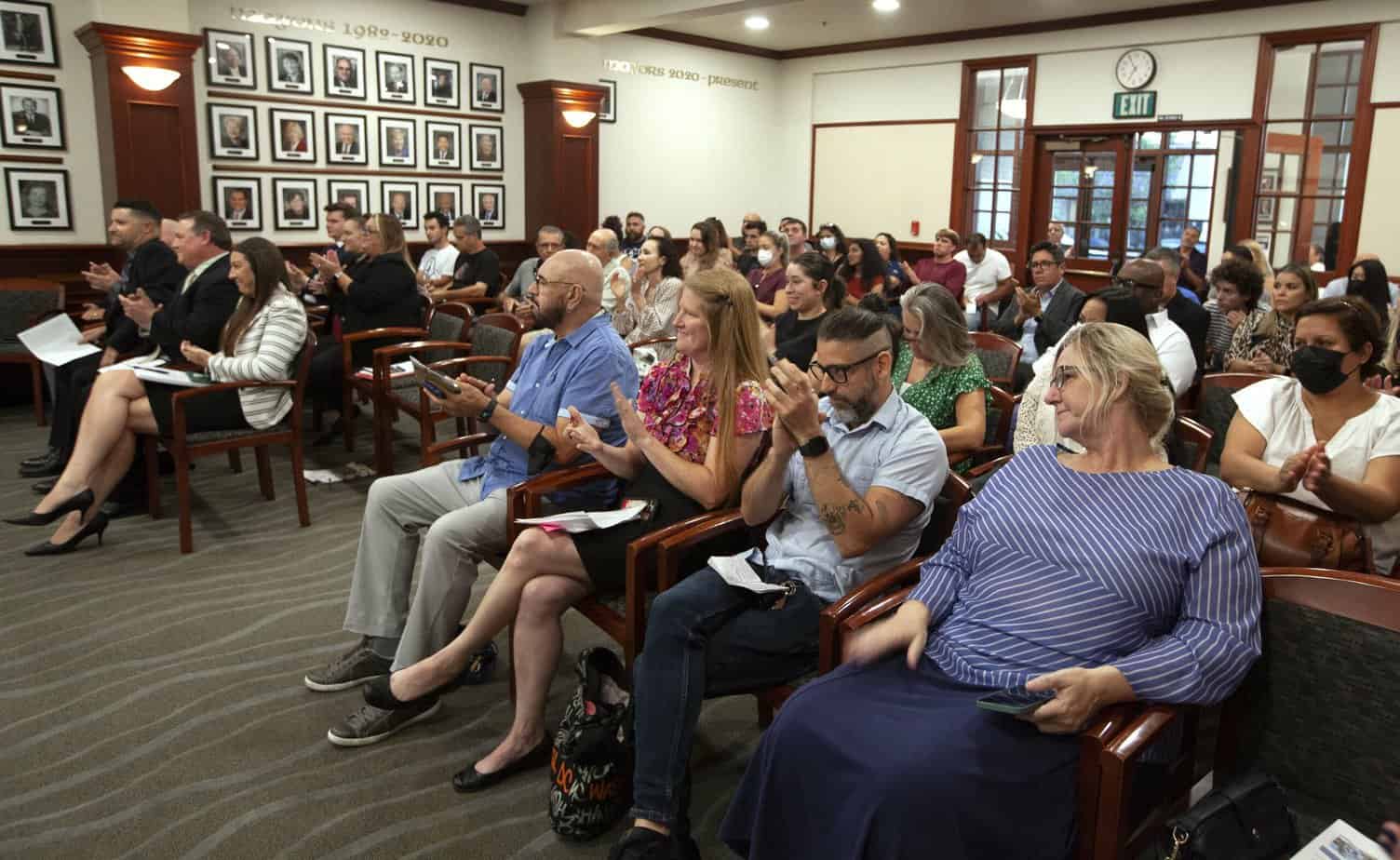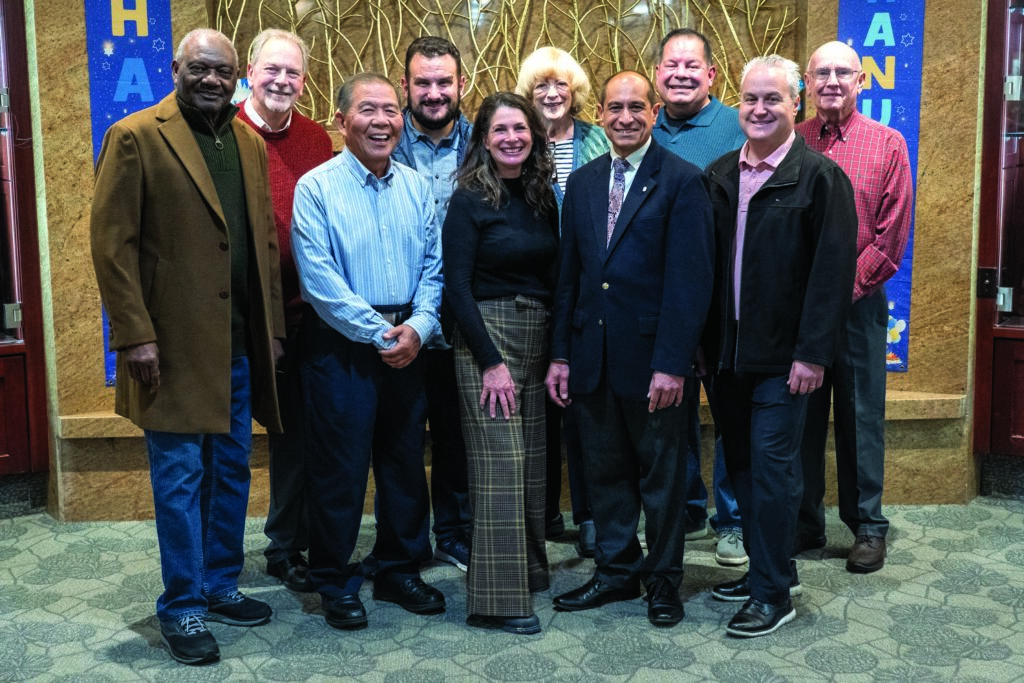Council hears vigorous public comment after August recess

Attendees at the Claremont City Council meeting applaud as a new city employee is introduced on Tuesday at city hall. The meeting attracted a rather large crowd, many of whom advocated for a rent stabilization ordinance during public comment. COURIER photo/Steven Felschundneff
by Steven Felschundneff | steven@claremont-courier.com
Following its August recess, the Claremont City Council was back in action Tuesday evening with a light agenda, yet much discussion.
The chamber was packed at 6:30 p.m. as the meeting got underway, which was surprising given the council would not be voting on any issues aside from the consent calendar, which is considered routine.
Monarch Terrace
During public comment several residents from the Monarch Terrace apartments showed up to lobby for a local rent stabilization ordinance to close the loophole in state law that allows property owners to evict tenants if the owner plans to do a substantial remodel that will result in pulling building permits and cause 30 days of displacement.
Public comment is limited to 30 minutes and is divided evenly between people speaking from the council chamber and those responding via Zoom. Nearly everyone who spoke in person was a resident of the apartment complex in the 500 block of Bucknell Drive. As a group, they expressed alarm that the current landlord, Revere Investments, was asking $3,300 to $3,700 per month for renovated units at the complex.
Elaine Thompson said Monarch Terrace residents feel safe and consider neighbors to be family. She also said housing laws must change to protect renters, both in California and in Claremont, so that she and the approximately 31 other renters at the complex will not be forced out.
A full story on Monarch Terrace appeared in the August 12 edition of the COURIER.
Public nuisance ordinance
Two other speakers focused on sex work and human trafficking taking place adjacent to Indian Hill Boulevard and the 10 Freeway, and the city’s proposed nuisance ordinance, which aims to curb criminal activity at Knights Inn, Claremont Lodge and Motel 6.
One speaker complained it was taking the city too long to pass the ordinance and demanded to know what was causing the delay. Due to the Brown Act, the council is not allowed to act on issues brought up during public comment, or even to discuss them at length during that time.
However, City Manager Adam Pirrie answered some of the speakers’ concerns, stating that the proposed ordinance would need to go to the planning commission before it was sent to the city council for a vote because it involved a change to zoning code. Pirrie said that would likely occur in late October.
Police Chief Aaron Fate said his department is not ignoring the sex worker issue, citing a recent special enforcement detail that netted eight arrests in two and-a-half hours. Adding that as department staffing improves, the frequency of these special enforcement details would increase.
Options for ADU grant program
Management analyst Alex Cousins gave a presentation on a proposed grant program that would provide small incentives to homeowners who construct accessory dwelling units on their properties.
An ADU is a freestanding, completely independent living space commonly constructed in the back or side yard of a single-family home. They have become increasingly popular because construction can be much cheaper than building a freestanding home on a vacant lot.
City staff was mainly seeking council guidance as to what would be the best program, but did offer suggestions, including that the grants be $20,000 per applicant, the household income be no more than $180,000, and the homeowner be required to rent out the ADU for three years.
Funding for the grants would come from the $8.7 million the city received from the American Rescue Plan Act. The council previously approved using $200,000 of this money for an ADU grant program for the current fiscal year and an additional $200,000 for next year.
“ADUs provide lower cost housing opportunities, while also allowing the City to use new ADU construction to meet the City’s Regional Housing Needs Allocation (RHNA). This grant would allow property owners to offset the cost of constructing ADUs and allow property owners to recoup their construction costs over a shorter period of time by renting to residents in need of housing,” according to a staff report.
The Claremont program was designed to work in tandem with one offered by the California Housing Finance Agency. The CHFA program offers a $40,000 reimbursement to homeowners for pre-development costs associated with ADU construction, including site prep, architectural designs, permits, soil tests, impact fees, property surveys, energy reports, utility hookups and interest rate buy downs, according to the staff report.
Staff suggested homeowners be allowed to ask market rate for an ADU, because a rent cap would make it harder to recoup the cost of construction.
During his presentation, Cousins showed a chart that broke down the significant cost of building an ADU, which ranged from $100,000 for a studio to more than $300,000 for a two-bedroom unit. There was a modest cost savings for a garage conversion. Also, under Claremont’s inclusionary housing rental program, a one-bedroom unit for a low-income renter cannot exceed $1,094 per month or $1,230 for a two-bedroom unit. However, according to the staff report, the median rent in Los Angeles County is $2,865 for a detached one-bedroom ADU and $3,820 for a two-bedroom unit. That would mean a homeowner would be subsidizing that unit at $20,000 to $30,000 per year for three years if a rent cap were part of the grant program.
The proposed grant program could also include junior accessory dwelling units, which are no more than 500 square feet and are completely contained in an existing unit. This option was well received, in part because the estimated construction costs are significantly lower at $20,000 to $68,000, meaning the grant could substantially reduce a homeowner’s portion of those expenditures.
Including some type of affordable component to the program was clearly a priority among members of the council. Proposed ideas included tying it in some way to the federal Section 8 program that provides guaranteed rent payments from the government.
Staff will use the council’s feedback to develop a final program, which will return to the council at a future meeting.










0 Comments